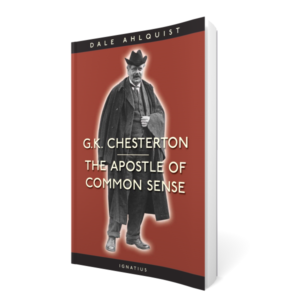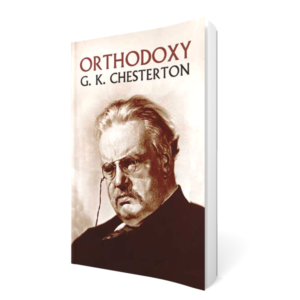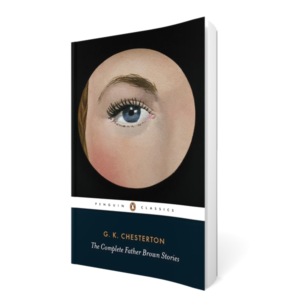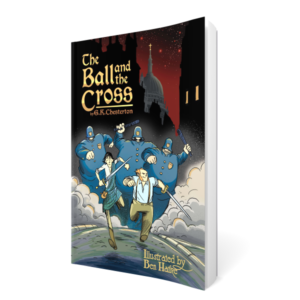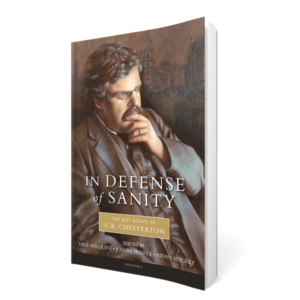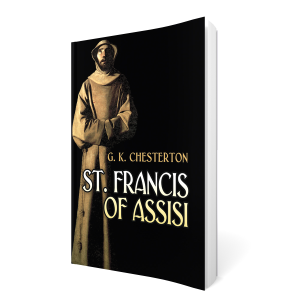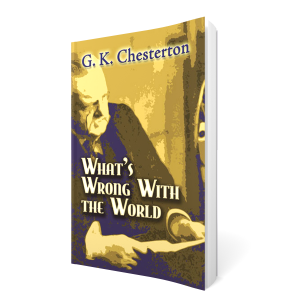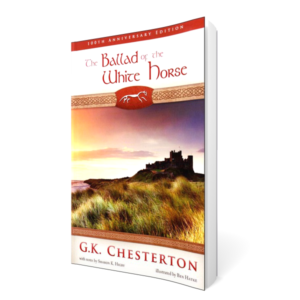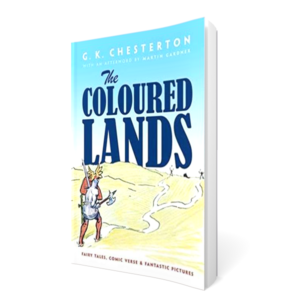Reading Plan
A System for Reading Chesterton
Introductory Books
Dale Ahlquist makes G.K. Chesterton accessible, highlighting Chesterton’s keen insight, marvelous wit, and relevance for today’s world.
G.K. Chesterton: The Apostle of Common Sense. An overview of Chesterton’s most important books, liberally spiced with quotations.
Common Sense 101: Lessons From G.K. Chesterton. Chesterton’s profound and prophetic insights on topics from the faith to the family.
Knight of the Holy Ghost. Dale Ahlquist’s newest book on Chesterton…the man, the writer, the potential saint.
Apologetics
Orthodoxy. Considered by many to be Chesterton’s best book, this is a unique and refreshing spiritual autobiography and defense of the Christian faith. Learn More
The Everlasting Man. One of Chesterton’s greatest and most important books, this is Chesterton’s view of history. Learn More
Fiction
The Complete Father Brown Stories. With his cherubic face and unworldly simplicity, Father Brown is one of the most unforgettable characters in literature. Learn More
The Man Who Was Thursday. Chesterton’s most famous novel, about a policeman who infiltrates a secret organization of anarchists. Learn More
The Ball and the Cross. A novel that acts out the debate between Christianity and atheism. Filled with humor, rich dialogue and striking allegorical imagery. Learn More
Manalive. A novel about Innocent Smith, a man who picnics on rooftops, breaks into his own house, and has an affair with his own wife. This is the book on how to live Chesterton! Learn More
Essays
In Defense of Sanity. G.K. Chesterton was a master essayist. But reading his essays is not just an exercise in studying a literary form at its finest, it is an encounter with timeless truths that jump off the page as fresh and powerful as the day they were written. The only problem with Chesterton’s essays is that there are too many of them—over five thousand! Three of the leading authorities on Chesterton selected the “best” Chesterton essays for this collection to help you get started. Learn More
Literary Criticism & Biographies
St. Francis. Cited as one of the best books ever written about St. Francis, this is the first real book written after Chesterton’s reception into the Catholic Church. Learn More
St. Thomas. Acclaimed as the best book ever written on Aquinas, Chesterton chronicles the saint’s life, focusing on the man and the events that shaped him. Learn More
The Soul of Wit: G.K. Chesterton on William Shakespeare. Chesterton took a keen interest in the English literary tradition, particularly in terms of the plays by the country’s greatest dramatist. In this original collection, Dale Ahlquist introduces the best of Chesterton’s Shakespeare-related essays and reviews. Learn More
Social Commentary & Economics
What’s Wrong With the World. Chesterton systematically takes on big government, big business, compulsory education, and feminism. More timely today than when he wrote it. Learn More
The Outline of Sanity. In his most systematic treatment of the economic theory of distributism, Chesterton presents a scathing critique of communism, capitalism, and commercialism, leaving the only logical alternative: the wide distribution of capital, private ownership, and productive property. Learn More
The Hound of Distributism, edited by Richard Aleman. A collection of essays on distributism written by G.K. Chesterton and leading distributist authors from around the world. Learn More
Poetry
Lepanto. Hilaire Belloc called Lepanto Chesterton’s greatest poem and the greatest poem of his generation. The poem provides insight into the modern conflict between Christianity and Islam, between Protestant and Catholic Europe, and the origin of the Feast of the Holy Rosary. Learn More
Ballad of the White Horse. One of the last great epic poems in the English language, the Ballad is the story of the English King Alfred, who fought the Danes in the year 878. But it is also the story of Christianity battling against the destructive forces of nihilism and heathenism—the battle we are still fighting.
Learn More
Collected Poetry. Throughout his life, G.K. Chesterton penned nearly a thousand poems that described his reaction to people and events. Chesterton’s drinking songs and traveling songs are perhaps Chesterton’s best known comic verse. The Coloured Lands presents a jolly medley of drawings, fables, and poetry—all laced with satirical wit. Chesterton’s fantasies reflect his overall philosophy of life, proclaiming the need for wonder in the face of the world of fact. Learn more about Chesterton’s poetry and other volumes featuring his verse.
Other Recommended Readings
Autobiography, G.K. Chesterton. Chesterton’s final book, finished a few weeks before his death. Learn More
G.K. Chesterton, Maisie Ward. The most definitive and authoritative biography of Chesterton.
Wisdom and Innocence, Joseph Pearce. A major biography of Chesterton, providing a great deal of important information never before published.
G.K. Chesterton: A Biography, Fr. Ian Ker. A monumental 750-page biography from Oxford University Press; presents the case that Chesterton is the intellectual and spiritual heir to Newman.
The Universe According to G.K. Chesterton, compiled by Dale Ahlquist. This book of “Chesternitions”—pithy and poetic definitions of words in the spirit of Samuel Johnson—is a glimpse of the dictionary Chesterton would have written!
The Tumbler of God: Chesterton as Mystic, Fr. Robert Wild. A spiritual portrait of G.K. Chesterton that convincingly shows why he is precisely the kind of new mystic we need. Chesterton’s mysticism was grounded in an experiential knowledge that existence is a gift from God, and that the only response is a spirituality of gratitude and praise for the unveiled beauty of creation.





